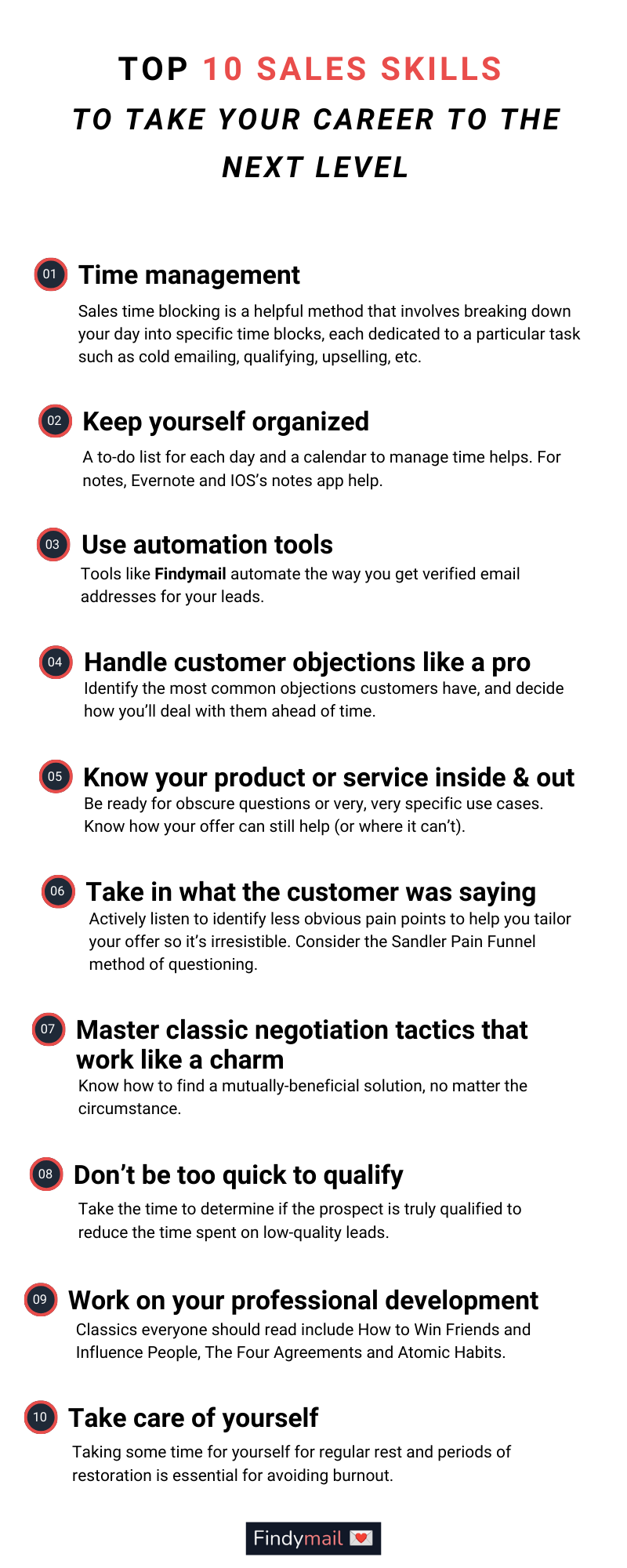If you're anything like me, you know that sales isn't just a job; it's a lifestyle.
It's the thrill of the chase, the rush of closing a deal, and the satisfaction of knowing that you've helped someone solve a problem– yes, I’m addicted to it.
But as much as we love what we do, we also know that staying ahead of the game in sales requires a certain set of skills.

That's why I'm excited to share with you the top 10 sales skills that have helped me and my peers take their careers (and their projects) to new heights.
Whether you've been at this for decades or just starting out, get ready to level up your sales game!
1) Time Management
First things first: when it comes to sales, time is money. So remember that your time is incredibly valuable, which is why mastering time management is crucial.
One of the most effective techniques I've found for managing my time is Sales Time Blocking. This method involves breaking down your day into specific time blocks, each dedicated to a particular task such as:
- Prospecting
- Replying to emails
- Making phone calls
- Following up with leads
By sticking to a schedule and dedicating specific times to each task, you can optimize your productivity and stay focused on your sales goals.
Let me give you an example of what I mean:
Last week, I had a huge sales pitch with a potential client. It was a make-or-break moment for me, so I knew I had to be on top of my game.
I blocked off the entire morning to prepare for the pitch, making sure to prioritize my talking points, and even a mock conversation of what I thought responses might be.
By the time the meeting rolled around, I was confident, prepared, and ready to close the deal.
And you know what? It worked!
So take it from me: mastering time management goes a long way.
2) Keep Yourself Organized
Yes, time management and staying organized go hand-in-hand. But it's hard to manage your time effectively if you don't have a clear plan of what needs to be done, and I’m not just talking about your sales plan.
Personally, I don't rely on "hope" or "gut feelings" when it comes to managing my tasks. Instead, I keep a running list of who I need to call or email for the week, along with specific times for each task.
I also make a to-do list for each day so I don’t forget anything important, and I’m not running around like a headless chicken.
But it's not just about keeping track of your tasks. It's also important to keep your workspace organized - both physical and virtual.
I make sure my desk is clutter-free and that everything has its place. After all, a cluttered space leads to a cluttered mind, and that's not something you want when you're trying to close that big deal.
Then, I make sure my email management system in Outlook is set up with tags and automation workflows, so I can focus on the most important messages first.
And here's a pro tip: don't be afraid to use technology to help you stay organized. (I personally like Evernote because it’s easy to keep track of tasks, notes, and even contacts.)
3) Make Use of Automation Tools
Successful salespeople know that the key to success is to let technology handle the tedious work so they can focus on the more critical areas of their job. That's where automation can be a lifesaver.
Now, it’s no secret that I love automation tools, especially when it comes to tasks like verifying emails, sending out cold emails, and sourcing leads.
That's one of the reasons I created my own tool, Findymail, which makes it easy to automatically pull leads’ verified email addresses from places like LinkedIn, Apollo, Sales Nav, and the rest of the web with just a few clicks.
With Findymail in charge of finding the right emails, I can focus on the areas that will drive up my cold email conversion rates, like crafting the perfect sales email, following up, and networking with others in the field.
Of course, there are plenty of other automation tools out there that can help you streamline your sales process.
So if you're looking to boost your productivity and improve your sales game, make sure to explore the world of sales automation tools. Trust me, your future self will thank you!
4) Handling Customer Objections Like a Pro Is Still One of the Top Sales Skills
No matter how good you are at sales, you're bound to run into objections from customers at some point.
But that doesn't mean you should give up and move on to the next prospect. In fact, handling objections is a crucial skill that every successful salesperson needs to master.
I make it a point to learn every possible objection that a customer might have and to have responses ready to go.
For example, if a customer tells me that my price is too high, I might say something like:
"I understand. But can I ask you, how important is email accuracy to your business?"
By asking questions and focusing on the customer's needs, I can often address their objections and move the conversation forward.
And even if I can't close the deal right away, I'm still building a relationship with the customer that could pay off in the future.
Of course, there are countless objections that a customer might have, and each one requires a slightly different approach. But by taking the time to anticipate objections and come up with responses, you'll be well-prepared to handle whatever comes your way.
Here are a few more examples of objections and how I might respond:
- Objection: "I'm happy with my current supplier."
Response: "That's great to hear! Can I ask you, what do you look for when selecting companies to work with?" - Objection: "I don't have the budget for this right now."
Response: "I completely understand. But I have to ask, how much do you think it would cost your business if you don't invest in a solution like this?" - Objection: "I need to think about it."
Response: "Of course! But let me ask, what factors are you considering as you make your decision?" - Objection: "I'm not sure this is the right fit for my company."
Response: "I understand your concern. Can you tell me more about what you're looking for in a solution like this, so I can see if we might be a good fit after all?" - Objection: "I need to get approval from my boss before making a decision." Response: "Absolutely, I completely understand. Can I ask you what you think your boss is looking for in a solution like this? Maybe I can help you make the case to them."
- Objection: "I don't have time to deal with this right now."
Response: "I get it; your time is valuable. But can I just take a minute to show you how this could save you time and streamline your workflow in the long run?"
Remember, objections are an inevitable part of the sales process, and each one presents an opportunity to learn more about the customer's needs and how you can help them.
5) Know Your Product/Service Inside & Out
Look, when it comes to sales, knowing your product inside and out is a game changer. You're not just selling. You're also being a problem solver for your clients. And the best way to do that is by truly understanding your product.
For example, with Findymail, I'm not just pitching a product to my clients. I'm showing them how it can save them time and help them grow their revenue.
And I can do that because I know the ins and outs of Findymail like the back of my hand. I understand how my tool can help streamline their lead generation process, and I'm able to explain it to them in a way that makes sense and share my own experiences so they can relate.
So my advice? Become an expert on your product.
Don't just memorize the features; understand how it solves real problems for your customers. When you do that, you'll be able to confidently pitch your product and offer insights and solutions that your competitors can't.
6) Shut Up and Listen
Listening is not just about hearing what the customer is saying; it's about truly understanding their needs and concerns.
When I first started, I thought I needed to talk a lot and sell, sell, sell. But I soon learned that the key to success was to really take in what the customer was saying. It's not about selling your product; it's about finding the best solution for your customer.
One way to make sure you're really listening is to take notes during the conversation.
This shows that you value what they are saying and that you are committed to finding something that works for them. It also helps you remember important details that you can use later on in the sales process.
I also like to ask open-ended questions. This means questions that can't be answered with just a "yes" or "no." This helps you get a better understanding of what the customer really needs.
And once you have that understanding, you can tailor your pitch to address those specific needs.
So, the next time you're on a sales call or meeting with a potential client, remember to focus on listening. It may take a little extra effort, but in the end, it will pay off in the form of a stronger relationship with your customer and more deals.
7) He Who Says the First Number Loses
This next skill is a classic negotiation tactic that works like a charm in sales, and it's all about playing your cards right.
You see, when it comes to pricing, you never want to be the first one to put a number on the table in a service business with pricing that’s not clearly defined. That's like showing your hand in a game of poker– you're basically giving the other person an advantage.
So, what do you do when a prospect asks you about the cost of your product or service? Well, you play it cool and turn the tables on them.
Instead of throwing out a number right away, you say something like, "Well, that really depends on your specific needs and budget."
Then, you ask some follow-up questions to get a better understanding of what they're looking for, such as:
- Does your company have the budget to invest in this solution?
- What's the biggest issue you're currently facing in your business?
- Besides price, what other factors do you consider when choosing a supplier?
By doing this, you're gathering valuable information that you can use to tailor your solution to their needs, and you're avoiding the risk of quoting a price that's too high or too low.
8) Top Sales Skills: Don’t Be Too Quick to Qualify
Time is a valuable commodity, and you don't want to waste yours or the prospect's. That's why it's crucial to quickly determine if your product/service is a good fit for the prospect.
I always have qualifying questions ready to go, so I can easily determine if someone is a potential customer or not.
For example, if I were selling a B2B software solution, I would ask questions like:
- How many employees does your company have?
- What kind of software are you currently using?
- What specific challenges are you looking to solve with a software solution?
- What's your timeframe for implementing a new solution?
- What's your budget for this type of solution?
These questions help me figure out if the prospect is a good fit for my software solution.
If their company is too small or doesn't have a need for my specific features, I can quickly move on to the next lead and a legit sale.
9) Work on Personal Development
The most successful people I've met in my career were always looking for ways to improve themselves.
They knew that in order to succeed in sales, they needed to continuously learn and develop new skills. That's why they spent a lot of time reading books, watching sales videos, and listening to audiobooks from some of the greatest minds in the industry.
Some of the classics that I recommend checking out are:
Besides the books, I also recommended watching videos and TED talks. You’ll definitely get new insights into pioneering sales techniques and find the right approach for your prospects.
The takeaway here is that to become a successful salesperson, you need to be committed to your personal and professional growth.
10) Don’t Forget Selfcare
Hey, you know what they say – all work and no play makes Jack a dull boy. And in sales, it's no different.
Taking care of yourself is a critical part of being a successful salesperson.
If you're not feeling your best, it can be hard to focus on closing deals and making those important connections. That's why it's essential to make sure you're getting enough rest, eating well, and exercising.
Personally, I love moving and going for a walk during my breaks.
You might be thinking, "Yeah, yeah, I've heard it all before," but trust me, it makes a big difference.
When you're working hard, it's easy to fall into the trap of thinking you have to be working all the time. But that's not the case. Taking some time for yourself for regular rest and periods of restoration is essential for avoiding burnout.
Maybe you like to play video games, spend time with friends and family, or just chill out with a good book. Whatever it is, make sure you're giving yourself permission to do it.
And don't let your work consume your life to the point where you don't have time for the people who matter most. Balance is key.
Remember, you don't have to sacrifice your physical and mental health or your relationships to be successful in sales. Take care of yourself, and you'll be in a much better position to crush your goals.
Final Thoughts on the Top Sales Skills
Selling is challenging, for sure. It's a tricky business that requires both natural talent and learned skills. But by mastering these 10 essential skills I’ve laid out here, you'll be well on your way to becoming a sales superstar:
- Actively listen.
- Separate your schedule into time blocks.
- Start automating routine tasks.
- Stay organized - no matter what it takes.
- Avoid trying to qualify leads too quickly.
- Learn how to handle customer objections like a pro.
- Understand how your product solves problems in different scenarios.
- Avoid being the first one to mention pricing in an open-ended negotiation call.
- Keep working on your skills.
- Take care of yourself like you take care of your pipeline!
But remember, it's not gonna happen overnight. Even the best salespeople out there have faced rejections and failures.
So don't give up– keep learning. With enough hard work and resilience, you'll hit those sales targets and reap the sweet rewards of a successful sales career!






